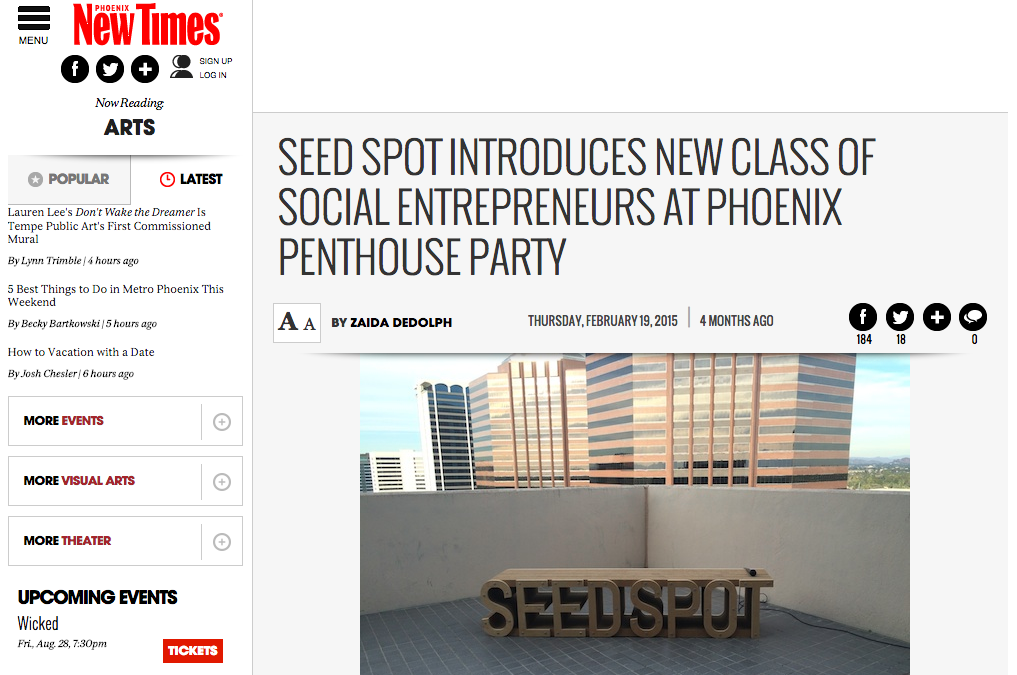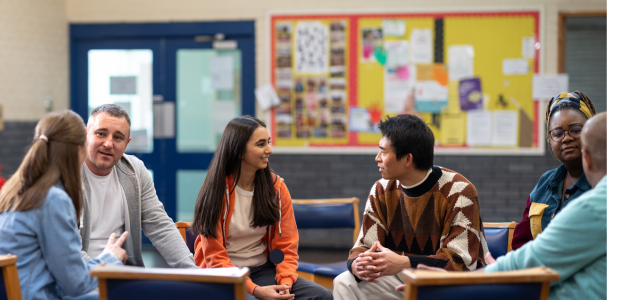Read the original AZ Central article here.
|
Seed Spot’s gathering at Bar Napkin Productions’ penthouse suite was nothing short of super baller.
Zaida Dedolph
|
At an event held in the penthouse suite at 2828 North Central (home to Bar Napkin Productions and beautiful CenPho sunset views), Seed Spot introduced this spring’s newly inducted class of social entrepreneurs.
And even Phoenix Mayor Greg Stanton came to get down.
Seed Spot is essentially a nonprofit boot camp for aspiring Phoenix-area businessfolk. Participants in the program (or “ventures,” as Seed Spot calls them) undergo an extensive application process, and are vetted by a team of business owners and investors prior to being accepted.
Once admitted to the program, Seed Spot ventures are provided with six months of training, one-on-one mentorship opportunities, critiques of their business plans, and opportunities to present to investors, philanthropists, and other interested parties. The key factor here is social entrepreneurship — Seed Spot seeks ventures who are not only committed to creating a quality service or product, but who will give back to their community in a meaningful way.
And for the past two years, Seed Spot has succeeded in cultivating community-centric businesses. As Mayor Stanton introduced this spring’s cohort, he spoke to the importance of keeping local entrepreneurs in Phoenix. Stanton has been present at all but one of Seed Spot’s kickoff events, as he put it, “Building an innovative ecosystem is so important to the future of our economy.”
Courtney Klein, Seed Spot’s CEO and co-founder, spoke to the impact the organization has on local industry. Of the 134 entrepreneurs that have entered the program, 88 percent are still in business, and 93 percent of those are still in Arizona, which seems to point to a healthy “innovative ecosystem,” as Stanton put it.
Alumni, new ventures, mentors, and board members alike sung Seed Spot’s praises at the event. The program was repeatedly referred to as “a family,” and we received probably about a dozen hugs from strangers who were happy to share their experiences. We’re pretty pro-hugging, and apparently so is Seed Spot.
|
Mayor Stanton is a huge Seed Spot fan
|
Several Seed Spot alumni have gone on to start innovative new businesses. Meghdad Abbaszadegan, who graduated in December 2014, launched a mobile app called Feel Free with the help of his Seed Spot training. Abbaszadegan’s background is in architecture and management, and as he puts it, “I have a passion for creating cultures around spaces. I wanted to create a universal culture that I could insert into any space and create a dynamic.”
Feel Free creates a digital “third space” out of. . . well, any space. “Bars and Coffee shops used to be a third space for people to meet and interact; now coffee shops are a place to do work and bars are a place to hook up.” The app can be compared to several others, but is in the end a very unique product. Feel Free is comparable to Four Square in that users check in at various events or locations. It’s similar to Grindr in that users can message others within the same area to facilitate face-to-face conversations (that’s totally what Grindr’s for, right? Having a nice chat with a stranger?). They also host events and meet-ups — always with what Abbaszadegan calls ” ‘a why,’ a reason, an emotional drive or experience that brings people together.” Feel Free’s end goal, and result, is the creation of welcoming community engagement and networking in any situation or location.
Abbaszadegan says that participating in Seed Spot helped move his idea to the next level. “I came out of the program with connections, mentors that truly care, and a solid business model. My business grows just as much as I grow; Seed Spot focuses on the entrepreneur and makes sure they are growing.”
Another recent graduate, Meghan Martinez, won December’s “Demo Day” (basically a Shark Tank-esque opportunity for Ventures to pitch their ideas to the public.) Her product, Keasy, is a keyless lock linked to a mobile app, which she has marketed to real estate professionals, renters, and AirBnB-ers. “We’re eliminating the risk of floating keys- keys can be copied or lost of stolen. Along with a floating key, when you have an online calendar that shows when you’re vacationing, things can get really risky.”
When Martinez started the program, “we had a working prototype and we had any idea, but really through the use of the curriculum, mentorship, and access to really smart people who have done it and done it well, we were able to target a much more specific audience and sell our product more efficiently.”
The current cohort is sure to be just as impressive. Though their ideas are still preliminary, many had a clear idea of what they’d like to bring to the table.
Monice Ottiano, for example, noticed a correlation between divorce or separation and homelessness that she feels must be addressed. “I was going through a divorce and went through divorce counseling. There were nine people there, and five of them had gone through some period of homelessness.” A former counselor of victims of domestic violence, Ottiano intends to create a transitional housing program for men and women who are going through a divorce or separation. They’d not only have a place to live throughout this time, but would have access to counseling, legal consultation, and education.
Other highlights of the incoming class include Greenlight Solutions, who aim to empower students and business owners to create sustainable solutions within their community. Chelsea Harden of the HEART Center will use her Seed Spot training to start a new, non-traditional school that focuses on the use of interactive educational activities for children with special needs. Danna Evans, founder of Arizona Vision and Hearing, wants to create a new platform for communication between school nurses, teachers, and parents regarding children’s health screenings. Dave Leedy of ZombieBox Incorporated has developed a portable product that will reduce noise pollution from power equipment and portable machinery by up to 50%, sparing us all from the hearing loss and general aggravation caused by these noises.
The list of innovative, community-oriented ideas goes on and on. It’s safe to say that this spring’s group will not let down their community (or their consumers).
The current class of Seed Spot ventures will pitch their workshopped ideas at “Demo Day” at theHerberger Theatre on May 19 at 5:30 p.m.; as Courtney Klein put it, “it’s kind of like Shark Tank, without the sharks.” Tickets to this event sell out notoriously quickly; visit Seed Spot’s website for more details.





